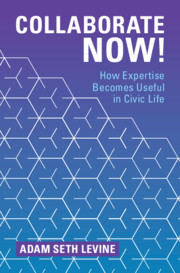Book contents
- Collaborate Now!
- Collaborate Now!
- Copyright page
- Contents
- Figures
- Tables
- Acknowledgments
- 1 Expertise and Collaborative Relationships in Civic Life
- 2 A Theory of Relationality
- 3 Relationality in Practice
- 4 The Link between Relationality and Collaborative Relationships
- 5 Surfacing and Meeting Unmet Desire for New Collaborative Relationships
- 6 Moving Forward
- Book part
- References
- Index
2 - A Theory of Relationality
Published online by Cambridge University Press: 14 March 2024
- Collaborate Now!
- Collaborate Now!
- Copyright page
- Contents
- Figures
- Tables
- Acknowledgments
- 1 Expertise and Collaborative Relationships in Civic Life
- 2 A Theory of Relationality
- 3 Relationality in Practice
- 4 The Link between Relationality and Collaborative Relationships
- 5 Surfacing and Meeting Unmet Desire for New Collaborative Relationships
- 6 Moving Forward
- Book part
- References
- Index
Summary
This chapter provides an overview of the theory of relationality – the idea that people care about how others relate to them, and whether they can successfully relate to others – and how potential collaborators can be uncertain about these relational aspects. “Relating to others” captures both the information to be shared, and also the experience of interacting. Key to the theory of relationality, as it applies to potential collaborators with diverse forms of expertise, is that status-based stereotypes can drive a wedge between having expertise and having that expertise be socially recognized. This chapter builds up to a series of hypotheses about how potential collaborators care about the information to be shared and the experience of interacting when choosing whether to engage in new collaborative relationships with diverse thinkers. It also identifies several possible interventions for fostering valuable new collaborative relationships.
- Type
- Chapter
- Information
- Collaborate Now!How Expertise Becomes Useful in Civic Life, pp. 41 - 50Publisher: Cambridge University PressPrint publication year: 2024

